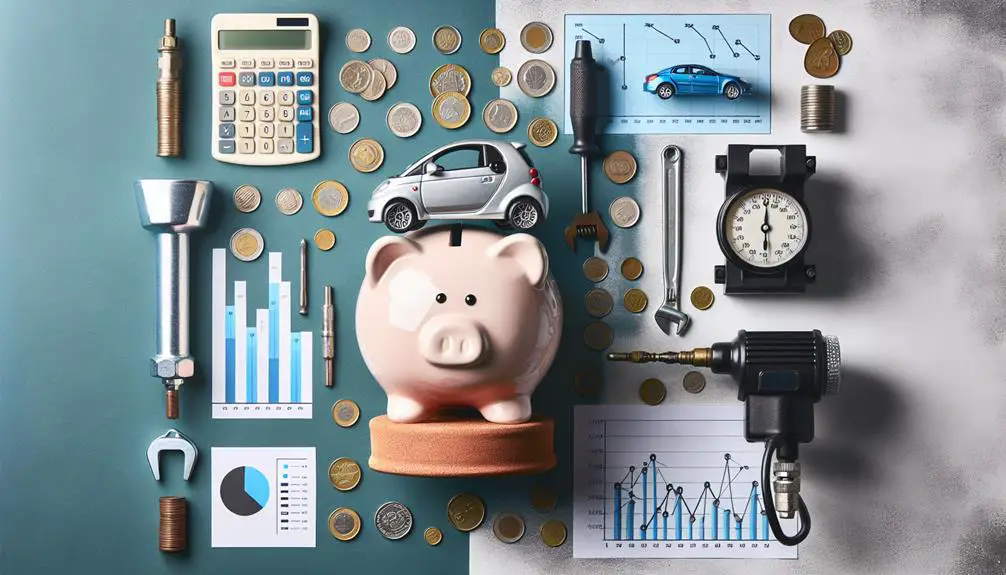The cost of a Hyundai compressor can vary significantly.
Factors such as OEM versus aftermarket parts, vehicle model, and purchase location influence this variation.
Understanding Compressor Costs

To grasp the cost of a Hyundai compressor, it's critical to contemplate different factors that influence its price. You've got to take into account the model and year of your Hyundai, as they've a substantial impact on the cost. Newer models, with their advanced technology, often require more sophisticated compressors, leading to a higher price tag.
The source of purchase plays a crucial role. Buying directly from a dealership might offer you peace of mind regarding authenticity and warranty, but it'll likely come with a higher cost compared to purchasing from independent auto parts stores or online marketplaces. You're paying extra for the assurance and convenience.
Don't forget the role of geographical location. Depending on where you're shopping, prices can vary because of shipping costs, availability, and demand. If you're in a region where Hyundai vehicles are popular, you might find competitive pricing because of the higher availability of parts. Conversely, in areas where these cars are less common, the scarcity of parts can drive up the price.
Comprehending these factors will help you navigate the market more effectively, ensuring you find a balance between cost, convenience, and quality when looking for a Hyundai compressor.
OEM Vs Aftermarket Options
Grasping the factors that influence the cost of a Hyundai compressor sets the stage for exploring your options, which include choosing between OEM and aftermarket parts.
OEM, or Original Equipment Manufacturer parts, are made by Hyundai or its designated supplier. They're guaranteed to fit and perform exactly like the part your car was built with. You're paying for peace of mind but at a premium. If you're not keen on compromising on quality and want a seamless match, OEM's your go-to. However, it's worth noting that this option usually comes with a heftier price tag.
On the flip side, aftermarket parts offer a more cost-effective solution. They're produced by companies other than Hyundai and are designed to function in a variety of makes and models. The upside? They're often less expensive and available in a wider variety, giving you more flexibility in price and quality. The catch? You might run into issues with fit and performance, and there's a chance they could void your warranty.
Ultimately, the choice between OEM and aftermarket depends on your budget, your car's warranty status, and how much you value originality and peace of mind.
Vehicle Model Impact

While the choice between OEM and aftermarket compressors is significant, the model of your Hyundai greatly influences the final cost. You've got to understand that not all Hyundai models are created equal regarding replacement parts, including the compressor. The year and model of your Hyundai play a critical role in determining how much you'll shell out.
For instance, if you're driving a newer, high-end model like the Hyundai Palisade, you're likely going to pay more for a compressor compared to someone driving an older Hyundai Accent. This is since newer models often require more sophisticated components that can handle advanced technology and stricter emissions standards. Plus, luxury or more feature-rich vehicles typically incorporate more complex systems that demand higher-priced parts.
It's not just about the upfront cost, either. The availability of parts for your specific model affects the price too. Older or less popular models might have less readily available components, potentially driving up the price because of scarcity. So, when you're budgeting for a compressor replacement, take a hard look at your Hyundai's model and year. It'll give you a clearer picture of what you're in for, financially speaking.
Purchase Venues and Prices
Exploring where to buy your Hyundai compressor reveals a range of prices and availability. Whether you're looking for an OEM (Original Equipment Manufacturer) part or a more budget-friendly aftermarket option, several purchase venues stand out. You'll find that prices can vary greatly based on where you choose to shop, and the type of compressor you need.
To keep you interested and informed, here are three main places to think about:
- Online Retailers: Websites like Amazon, eBay, and specialized automotive parts stores offer a wide selection of compressors for different Hyundai models. You can often find competitive prices here, but be sure to check the seller's ratings and reviews.
- Auto Parts Stores: Chain stores like AutoZone or Advance Auto Parts provide the convenience of in-person shopping. They can offer advice and sometimes even installation services, but their prices might be higher than online.
- Dealerships: For those prioritizing part authenticity and warranty, purchasing directly from a Hyundai dealership is the best option. However, this convenience and assurance come at a premium price compared to other venues.
Budgeting for Replacement

Determining your budget for a Hyundai compressor replacement requires grasping the different costs involved. It isn't just about the compressor's price; you've got to take into account labor costs, potential additional part replacements, and even the timing of the replacement.
Labor costs can vary widely depending on where you live and the mechanic you choose. It's usually a good chunk of the total expense, so don't overlook it when planning your budget.
You'll need to think about the quality of the compressor you're aiming for. High-quality compressors might hit your wallet harder initially but can save you money in the long run by lasting longer and performing better. On the flip side, opting for a cheaper alternative might mean more frequent replacements or repairs down the line.
Don't forget to factor in any extra parts that might need replacing during the compressor installation. These could include hoses, belts, or even the refrigerant. Each of these adds to the total cost.
In short, when you're budgeting for a Hyundai compressor replacement, take into account not just the compressor's price but also labor, quality, and additional parts. A well-rounded budget plan ensures no surprises and a smoother replacement process.
Conclusion
To sum up, you've got a range of choices when it comes to replacing your Hyundai's compressor. Whether you opt for an OEM or an aftermarket option, keep in mind that your vehicle model greatly influences the cost.
You can find these parts through different purchase venues, each with its own pricing strategy. So, as you budget for this replacement, weigh your options carefully. With a bit of research, you'll find the right balance between quality and affordability that suits your needs.
